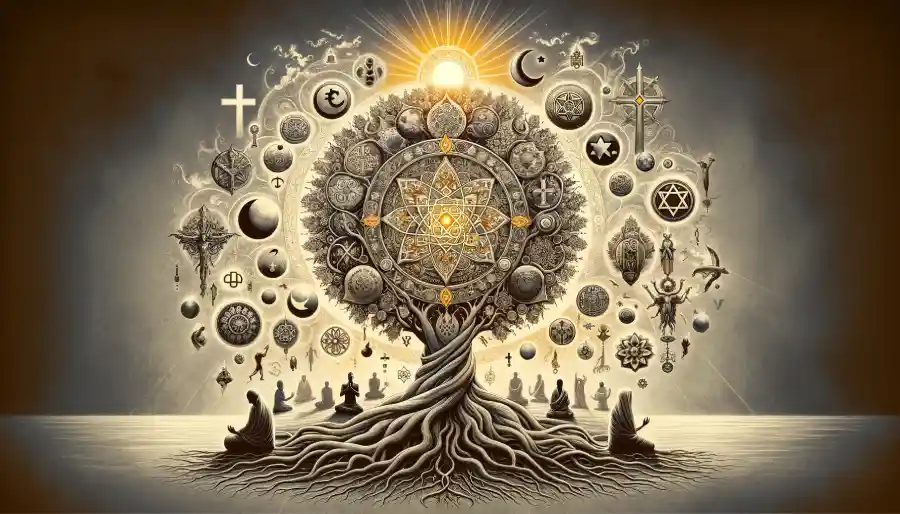Dogmák in Religion: Faith, Belief, and Authority
Dogmák are like the big, important rules or beliefs in different religions. They are really special because they help shape what people in these religions believe and how they live. Think of them as the main ideas or truths that religions are built on. These ideas come from holy books, what religious leaders say, and what people in the past have believed.
In this article, we’re going to take a closer look at dogmák and see why they’re so important in religions like Christianity, Islam, Hinduism, Buddhism, and Judaism. We’ll see how these big beliefs started a long time ago and how they’ve changed over time, but still keep their main meaning.
Understanding dogmák is really helpful if you want to know more about different religions and why people believe what they do. These beliefs are not just old ideas; they are still very important today. They guide how people in these religions live, pray, and see the world.
We’ll explore how dogmák affect not just groups of people in a religion, but also each person’s own faith and life. We’ll also talk about some of the tough questions and different opinions people have about these beliefs.
So, get ready to learn about these big religious beliefs, how they’ve shaped history, and how they still play a big part in people’s lives today. It’s like a journey to understand what’s at the heart of different religions and what makes them special.
Historical and Cultural Origins of Dogmák
Dogmák, the foundational beliefs of religions, have deep historical roots. In ancient times, these beliefs were already shaping how people understood the world and their place in it. These early instances of dogmatic beliefs laid the groundwork for many religious practices we see today.
As time passed, these dogmák evolved. Different cultures and eras interpreted them in their own ways, leading to a rich tapestry of religious expression. This evolution shows how adaptable and enduring these core beliefs are, changing in form but constant in their importance.
Dogmák in Major World Religions
In Christianity, dogma like the Trinity and the Resurrection are central. They’re not just beliefs but also shape the entire theological framework of the religion, influencing everything from worship to moral teachings.
Islam’s core dogmák, such as the oneness of God (Tawhid) and the prophethood of Muhammad, are fundamental to the Islamic faith. They guide the daily practices and spiritual lives of Muslims around the world.
Other major religions like Hinduism, Buddhism, and Judaism also have their own dogmák. These beliefs, whether they’re about the nature of reality, the path to enlightenment, or the relationship with a divine being, form the backbone of these faiths.
The Interplay of Faith and Reason in Dogmák
Dogmák are often rooted more in faith than in empirical evidence. This faith-based approach gives them a unique place in the religious experience, where belief often transcends the need for physical proof.
However, this doesn’t mean that reason and rationality are absent in the world of dogmák. Theological reasoning plays a crucial role in interpreting these beliefs, helping believers understand and integrate them into their lives.
The Societal and Personal Impact of Dogmák
Dogmák do more than just define religious beliefs; they also contribute to the unity and identity of religious communities. They create a common ground for people to come together and share their faith.
On a personal level, these beliefs deeply impact individual spiritual journeys. They provide a framework for understanding the world and one’s place in it, guiding personal growth and moral development.
Controversies and Challenges Surrounding Dogmák
In the modern world, interpreting ancient dogmák can be challenging. As societies evolve, so do perspectives on these age-old beliefs, leading to debates and differing interpretations.
The coexistence of diverse beliefs in a pluralistic society also presents its own challenges. Navigating these differences while maintaining respect for each dogma’s unique perspective is a delicate balance.
Conclusion
Dogmák have played and continue to play a vital role in shaping world religions. They are not static relics of the past but living elements of faith that evolve and adapt to the changing world. As we reflect on their ongoing relevance, it’s clear that understanding these core beliefs is key to understanding the rich diversity of religious expression and experience in our world.
FAQs
What are Dogmák and Why are They Important?
Dogmák are the big, main beliefs in a religion that people really believe in and don’t question. They are super important because they tell people in the religion what to think about big things like God, life, and how to act. These beliefs help people understand their religion better and explain why they do certain things in their religion.
Do Different Religions Have Different Dogmák?
Yes, different religions have their own special dogmák. For example, in Christianity, people believe in the Trinity and that Jesus came back to life. In Islam, it’s really important to believe that there is only one God and that Muhammad is His prophet. Religions like Hinduism, Buddhism, and Judaism each have their own big beliefs too. These beliefs make each religion special and different from others.
Can Dogmák Change, and How Do They Affect People Today?
Dogmák usually don’t change much because they are so important, but the way people understand them can change over time. This helps these beliefs stay important and meaningful for people today. Dogmák guide people in how they live and make decisions, and they help people figure out their place in the world. They also shape how groups of people in a religion think and act together.







